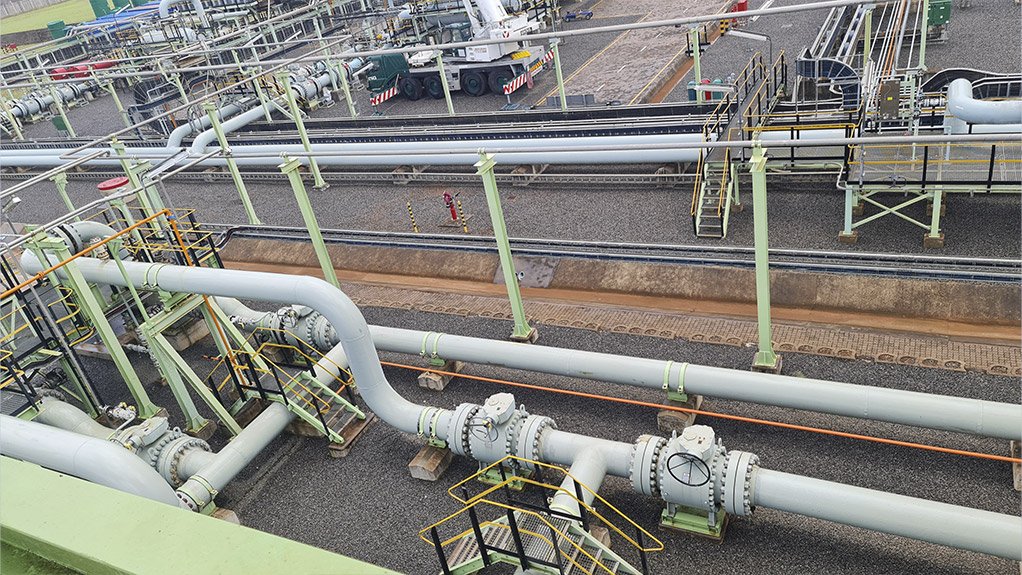Gas is a key enabler for economic growth and social development in the Southern Africa region, and a cleaner alternative to fossil fuels, says joint venture (JV) Republic of Mozambique Pipeline Investments Company (Rompco) CEO Mlandzeni Boyce, who underscores the importance of gas as a “transitional bridge between coal and renewable-energy sources”.
Established as a JV between the governments of South Africa – represented by the South African Gas Development Company (iGas) – and Mozambique, represented by Companhia Moçambicana de Gasoduto (CMG), along with integrated energy and chemical company Sasol, Rompco plays a strategic role in connecting Mozambique’s rich gasfields with South Africa’s energy market.
Rompco operates an 865 km pipeline – referred to as the Mozambique-Secunda Pipeline (MSP) – linking Mozambique gas fields to markets in Mozambique and operations in Secunda, in South Africa’s Mpumalanga province.
The pipeline has been “instrumental” in supplying both Mozambique and South Africa with energy, especially during times of power outages and loadshedding, says Boyce.
With a capacity of about 212 petajoules (PJ) a year and enhanced by additional loop lines and compressor stations, the pipeline caters to the growing energy demand in Southern Africa, fuelling industrial growth and employment.
Should the market expand significantly through gas-to-power (GtP) uptake and general industrial growth, Boyce says Rompco would be in a position to install additional loop lines and increase the capacity to 400 PJ, thereby remaining a strategic asset to push gas volumes into the market.
Currently, Rompco has between 40 PJ to 45 PJ spare capacity on the pipeline stretching from Ressano Garcia, in Mozambique’s Maputo province, to South Africa.
This capacity is offered to the market on a first-come, first-served basis. However, to use this capacity, customers are required to enter into gas supply agreements (GSAs) with the owners of the gas molecules.
Rompco is actively facilitating this process by ensuring continuous discussions between gas users and suppliers. The company is also working closely with regulators to create an environment that is conducive and cost-effective for new market entrants and existing shippers or users with expansion plans.
Energy Evolution
Since the MSP’s start in 2004, the pipeline has been a key driver in monetising gas resources, contributing to revenue generation and diversifying energy mixes in both countries.
“It has also been instrumental in promoting black empowerment and stands as the only pipeline company transmitting gas from Mozambique to South Africa,” Boyce avers.
He adds that Rompco is “pivotal in transitioning the energy mix from coal to renewable energy, with natural gas accounting for 3% of South Africa’s energy portfolio”.
South Africa's gas consumption totals around 185 PJ/y, and encompasses methane-rich gas. This consumption is divided into two primary segments: 120 PJ used for synthetic fuels, and 65 PJ allocated to industrial purposes.
The industries supported by the MSP also generate over R300-billion in taxable revenue.
In alignment with the Integrated Resource Plan 2023, Boyce says Rompco aims to play a pivotal role by supplying a significant amount of gas needed for GtP and industrial applications in South Africa, using the MSP for delivery from Mozambique.
“Given the shift towards cleaner energy sources and the current power generation deficit in South Africa, we anticipate an increase in demand for gas, particularly as more power developers are likely to initiate GtP projects in the region,” he tells Engineering News.
Although Rompco anticipates the potential of its pipeline to transport green hydrogen in the future, the development of the natural gas market in the region faces several challenges such as limited infrastructure, regulatory barriers and price competitiveness.
Rompco is collaborating with key players to ensure that its assets contribute effectively to the Southern African Development Community Gas Masterplan, which aims to unify the economies of the region by guaranteeing energy security.
“As we shift towards cleaner energy sources to combat global warming and reduce carbon footprints, the expansion of the gas value chain in the region is anticipated. We are conducting studies to evaluate future expansions, as well as potential connections along the pipeline, in response to potential increases in gas demand and supply, and to address infrastructure challenges,” Boyce explains.
As most African countries are relatively small in terms of population and gross domestic product per capita, they may struggle with the high costs of establishing infrastructure for their modest domestic markets.
He suggests, therefore, that these countries share costs and benefit collectively by pooling their resources to adopt new partnerships, which, in turn, can create a framework for building stronger ties between countries and fostering economic growth.
Gold Sponsorship
As a prominent gold sponsor at the Africa Energy Indaba (AEI), Rompco is “dedicated to playing a significant role in discussions and activities that influence energy policies across Africa”.
Boyce will be a key speaker at the main conference, participating in important plenary panel sessions that focus on topics such as ‘Maximising the Value of Africa’s Natural Resources’ and addressing a potential gas crisis.
“Our active participation in the AEI underscores our commitment to enhancing the energy sector in the region. We eagerly anticipate collaborating with industry experts, government representatives and other key players to collectively tackle energy challenges and contribute to a prosperous future for our nation and the continent at large,” he concludes.
Edited by: Nadine James
Features Deputy Editor
EMAIL THIS ARTICLE SAVE THIS ARTICLE
ARTICLE ENQUIRY
To subscribe email subscriptions@creamermedia.co.za or click here
To advertise email advertising@creamermedia.co.za or click here















